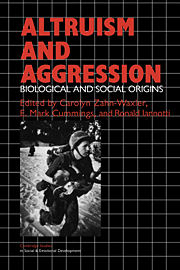Book contents
- Frontmatter
- Contents
- List of contributors
- Editorial preface
- Introduction: Altruism and aggression: problems and progress in research
- Part I Biological, sociobiological, and ethological approaches to the study of altruism and aggression
- Part II Development, socialization, and mediators of altruism and aggression in children
- 5 A conception of the determinants and development of altruism and aggression: motives, the self, and the environment
- 6 Early organization of altruism and aggression: developmental patterns and individual differences
- 7 Aggression and altruism: a personality perspective
- 8 The socialization of prosocial behavior: theory and reality
- 9 Social-interactional patterns in families of abused and nonabused children
- 10 Naturalistic observation of cooperation, helping, and sharing and their associations with empathy and affect
- 11 Social information-processing variables in the development of aggression and altruism in children
- Conclusions: lessons from the past and a look to the future
- Index of names
- Index of subjects
11 - Social information-processing variables in the development of aggression and altruism in children
Published online by Cambridge University Press: 04 August 2010
- Frontmatter
- Contents
- List of contributors
- Editorial preface
- Introduction: Altruism and aggression: problems and progress in research
- Part I Biological, sociobiological, and ethological approaches to the study of altruism and aggression
- Part II Development, socialization, and mediators of altruism and aggression in children
- 5 A conception of the determinants and development of altruism and aggression: motives, the self, and the environment
- 6 Early organization of altruism and aggression: developmental patterns and individual differences
- 7 Aggression and altruism: a personality perspective
- 8 The socialization of prosocial behavior: theory and reality
- 9 Social-interactional patterns in families of abused and nonabused children
- 10 Naturalistic observation of cooperation, helping, and sharing and their associations with empathy and affect
- 11 Social information-processing variables in the development of aggression and altruism in children
- Conclusions: lessons from the past and a look to the future
- Index of names
- Index of subjects
Summary
In spite of a long history of studying children's cognitive processes and an equally long history of studying children's social and aggressive behavior, until recently researchers have largely ignored the study of the relation between cognition and social behavior (cf. Flavell & Ross, 1981). Likewise, Parke and Slaby (1983) recently chastised researchers for failing to view aggressive behavior in its broad ecological context. The goal of this chapter is to integrate the study of aggression with an understanding of children's cognitive and social development. This work may contribute to our understanding of children's social cognitive processes as well as lead to intervention efforts aimed at reducing aggressive behavior and increasing prosocial behavior in children.
This chapter briefly reviews recent research that bears on this problem. While this research covers a broad range of cognitive processes, including social cognitive skills and attributions, it suffers greatly from the lack of a comprehensive theory of the ways in which children process social cues and come to respond behaviorally in a social interaction. The framework for such a theory, in the form of a social information-processing model, is formulated in this chapter. A set of research studies that utilize this model is described in some detail. These studies suggest that children's cognitive processes and social behavior can reciprocally influence each other in a way that can perpetuate deviant aggressive behavior. This hypothesis is supported by an observational study of children's play behavior over time.
- Type
- Chapter
- Information
- Altruism and AggressionSocial and Biological Origins, pp. 280 - 302Publisher: Cambridge University PressPrint publication year: 1986
- 18
- Cited by



